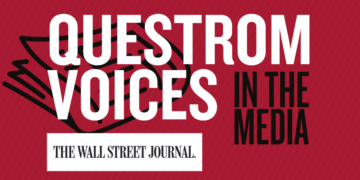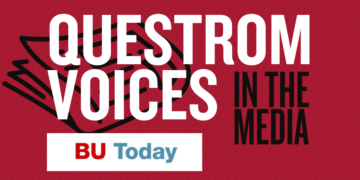In today’s ever-evolving world, discussions about capitalism are more relevant than ever. As business schools strive to shape the next generation of leaders, it is essential to offer students a balanced understanding of capitalism—its merits and its flaws. In this Q&A piece, we explore an innovative course that merges classic economic theory with cinematic analysis, providing students with a more nuanced view of capitalism’s impact on society. Titled Capitalism: Justifications and Cinematic Impressions, the course is taught by Michael Salinger, the Jacqueline and Arthur Bahr Professor of Markets, Public Policy, and Law at Boston University’s Questrom School of Business. He shares his insights into the course’s creation, the texts and films that drive its discussions, and how movies with corporate villains influence public perceptions of capitalism.
What initially drew you to teach a course like this? Are there any particular films, readings, or ideas that sparked your interest in the reputation of capitalism?
The course would not have happened if we had not received the funding for the Mehrotra Institute for Business, Markets, and Society. Part of the motivation for the institute is the belief that many people – our students included – have an overly negative view of capitalism and of business. Part of the mission of the institute is to do a better job of teaching about capitalism. And by “doing a better job,” I do not mean preaching the virtues of capitalism but rather, getting students to think critically both about capitalism and the criticisms of it.
This course combines the study of capitalism with cinematic depictions of corporate behavior. What do you hope students will gain by examining these two topics side by side?
I would break up your question into two parts. First, why have a course about capitalism and second, how do the movies fit in? On the first part, there is not much debate about doing away with private property or organizing production around private firms, which are two hallmarks of capitalism. But there is substantial debate about the role of the profit motive. One of the most famous lines from The Wealth of Nations is: “It is not from the benevolence of the butcher, the brewer, or the baker, that we expect our dinner, but from their regard to their own interest.” Adam Smith’s point was that not only is there nothing wrong with businesses pursuing profits but, rather, that we benefit from profit-seeking behavior at least as long as it is subject to the discipline of market competition and within the confines of the law. While the reference to the butcher, the brewer, and the baker might seem quaint, that line gets to the heart of the shareholder versus stakeholder debate about business objectives. While it might not be crucial in their first jobs, we hope that our students will rise to levels in which they will make decisions for which they will need to think about whether their objective is to maximize shareholder value or whether they are willing to sacrifice shareholder value to promote the interests of some other stakeholder. When they reach that level, they will benefit from having thought about the issues as students. On the second part, there were two reasons for having movies as part of the course. One is that it just made the course more interesting. But the other is that the movies all provided case studies that provided an opportunity to think critically about the arguments about both the benefits of capitalism and the seam side of capitalism.
You mention reading classic works that support capitalism within the course. Could you give us an example of one of these texts, and why it’s important for students to engage with it in this course?
A selection from The Wealth of Nations was a pretty obvious choice. The works by Hayek and Schumpeter are less familiar to many people. In econ 101, students learn about a set of assumptions under which market outcomes result in an efficient allocation of scarce resources and a set of public policies that can improve the allocation of resources when those conditions do not hold. An example of such a correction would be a tax on activities that generate pollution, which economists refer to as a “negative externality.” In the first half of the 20th century, there was a literature on how society could achieve the same efficient allocation of scarce resources as one gets from the econ 101 arguments with a socialist system meaning a system with public ownership of the major means of production. In essence, the argument was that a central planner could set competitive prices and tell managers to maximize profits given those prices. Hayek and Schumpeter came up with different reasons for why the arguments for so-called market socialism were misguided. Hayek’s argument was that a central planner could never have the information that would be needed to set the right prices. Instead, he argued that market prices are amazingly efficient summaries of widely-dispersed knowledge about supply and demand. Schumpeter focused on innovation. He argued that the most important benefit from capitalism is the incentive it provides to develop new, disruptive technologies. Compared to that, he considered the efficiency of the allocation of scarce resources using existing technology to be relatively unimportant.
Why is it important for students to understand these arguments? I think it is because we, as a business school, want to teach our students not only the tools they need to succeed in business but also to have an understanding of the role business plays in promoting broader societal goals.
What inspired you to create a course that blends cinematic analysis with economic theory? Do you believe movies are an effective way to engage students with complex economic topics like capitalism?
It was just an idea that came to me when we first got the funding for the institute and we were thinking about educational initiatives. I threw it out as an idea, and everyone seemed to think it was a good one.
What is the curriculum of this course and why did you choose to structure it this way?
There were two parts of the course. The first was readings about capitalism. While most of them were about the benefits of capitalism, I also had the students read the Communist Manifesto. The second part was the movies. Each week we had a theme: environment, finance, consumer protection, sexism, racism, labor.
Do you think movies with corporate villains (like The Wolf of Wall Street or The Social Network) play a large role in the popular discourse about capitalism, or do they just reinforce existing views?
A premise of the course was that movies like that do affect perceptions of capitalism. Bad behavior is more entertaining than good behavior. I did not assign those two movies, but some of the students wrote their term papers about them and they are both interesting cases to consider. The arguments for the societal benefits from capitalism presume that companies operate within the law and that the government in fact enforces the law. In The Wolf of Wall Street, Jordan Belfort ends up going to jail. It’s true, though, that he got away with breaking the law longer than he would have with better enforcement. As for The Social Network, you can argue whether Zuckerberg treated his partner or the Winklevoss twins fairly and it certainly does not paint a flattering picture of him as a person, but the basic story actually exemplifies Schumpeter’s arguments about innovation and creative destruction. There are some legitimate current public policy issues associated with Meta/Facebook, but the movie itself describes the development of a product that became so successful because people loved it.
Do you think that students leave this course with a more critical view of capitalism, or do some feel more ambivalent after discussing these films and readings?
There is really a mix. Some came to the class with a positive view of capitalism. Some – probably most – had a somewhat negative view. Maybe some of them changed their minds somewhat. But I hope that those whose positions did not change left with the ability to argue their views in a more sophisticated and nuanced way.
Considering changing attitudes toward capitalism, especially with movements like stakeholder capitalism, how do you think the course encourages students to rethink traditional views on profit-seeking behavior in business?
I suspect the majority of the students believe in the stakeholder rather than the shareholder perspective. I suspect that is also true of the majority of the Questrom faculty. One of the points I stressed in class is the importance of not caricaturing the shareholder perspective. First, it is important to recognize that the shareholder/profit maximization perspective does not mean maximizing the next quarter’s or the next year’s reported accounting profits. The Google prospectus included a famous letter from the founders saying that they were going to worry about long-term value, not quarterly earnings. Amazon had accounting losses for many years. Both were pretty successful at pursuing shareholder value. Second, one must distinguish between shareholder value maximization within the confines of the law and breaking the law. Third, and perhaps most importantly, the shareholder perspective does not imply that firms should ignore their customers, workers, suppliers, and community. Companies do not maximize shareholder value by abusing the other stakeholders. I often hear people arguing for, for example, considering the workers with the argument that having well-paid satisfied workers will increase profits because it will allow the company to get better and more loyal workers. Fine, but that’s an argument for the shareholder view, not the stakeholder view. To take the stakeholder view, you need to argue that companies should be willing to sacrifice shareholder value to benefit other stakeholders; and, if you take that view, you need to think about how to make those trade-offs. So, I hope that whatever position students take after having taken the course and whether or not they changed their minds at all, they have a more sophisticated view of the issues.
How do you think movies influence public perception of capitalism? Are they a reflection of real-world corporate issues, or do they more often exaggerate or fictionalize them for dramatic effect?
I’ll go back to what I said before. Bad corporate behavior is more entertaining than good corporate behavior; and nuance often does not make it more entertaining.






















